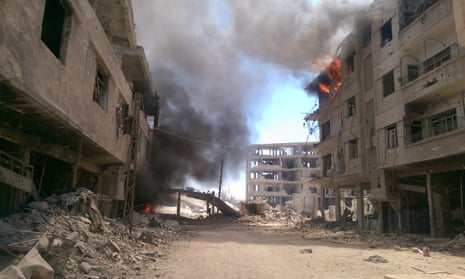The besieged Syrian town of Darayya, a symbol of the rebellion against the regime of Bashar al-Assad, is to be taken over by government forces after the last rebel fighters agreed to hand over their weapons and leave.
The surrender and evacuation of the Damascus suburb after a brutal four-year siege is a devastating blow to opposition morale and a long-sought prize for Assad. Weeks of intense bombardment, which activists claim included napalm attacks, has finally overwhelmed rebels.
The evacuation will be carried out in stages, with fighters leaving for opposition-controlled areas, but the fate of the few thousand civilians who have endured years of fighting and deprivation is still unclear.
“The Assad regime and the armed groups in Darayya agreed on a ceasefire as an interlude to a settlement that includes evacuating civilians as of tomorrow, Friday,” a member of the local council told the Guardian.
Families fear being forced to separate, and many of the people left in the city are worried that if they are forced into government-held areas they will disappear into jail for their activism in Darayya, or face an even grimmer fate.
“The civilians are forced mainly to go to the regime-held areas. It is said that the families of the fighters can go with them, but nothing is confirmed yet. Tomorrow, when they come to take the first group of civilians, we will know further details,” the council member said.
The fighters who join other opposition forces will be celebrated for their years of resistance, said Osama Abu Zaid, legal consultant to the Free Syrian Army. “We are awaiting the heroes of Darayya, the courageous,” he added, saving his criticism for western powers that he said offered no support.
“For four years Darayya was under siege and the international community did nothing,” he said in a radio broadcast in northern Syria. “Four years and the United Nations couldn’t provide any humanitarian aid, except once.”
The town became known as a centre for the opposition from the start of the uprising against Assad, which later turned into civil war. “Darayya was one of the very first towns to go against Assad. We started very early and we were so peaceful, we didn’t take the choice of raising arms for a full year,” said Kholoud Waleed, an activist from the town who now lives in exile.
Darayya was the home of Ghiath Matar, an activist committed to non-violence. He was famous for handing out roses and bottles of water to government soldiers when they first entered the town in summer 2011. He inspired pro-democracy protesters around Syria, but that autumn he was killed, his body disfigured and his throat cut out.
The town was also the site of a notorious massacre by government forces almost four years to the day before the surrender was agreed. They stormed in to make house-to-house searches, and left hundreds dead in one of the worst killing sprees of the war.
Like many of Darayya’s residents, Waleed fled as Assad’s troops began laying a siege on the town in 2012. Those who managed to cling on inside the military cordon survived by growing their own food in fields between houses. But in recent weeks fighters and civilians had been pinned into just a few blocks with nowhere to produce food, Waleed said.
Heavy fighting continues around the city of Aleppo, with reports of civilian casualties on both sides. Activists said 13 people, most of them children, were killed this week by a government barrel bomb dropped on a residential area.
In northern Syria, a rebel force backed by Turkish special forces, tanks and aircraft entered the town of Jarablus, one of the last Islamic State strongholds along the border, as Ankara demanded Kurdish militia fighters retreat to the east side of the Euphrates river within a week.
Turkey wants to secure the border and drive back Isis after a bomb at a wedding on Turkish soil killed dozens of people. However, Ankara is also concerned about the rapid advance by the Kurdish YPG militia across former Isis strongholds.
It wants to prevent the fighters, who have been advancing fast with US air support, from seizing territory and consolidating control that could fuel the ambitions of Kurdish insurgents inside Turkey.
Additional reporting by Hussein Akoush
